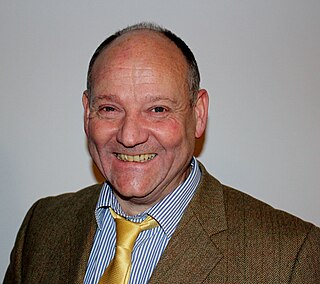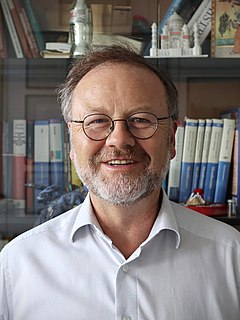
Stanley Benjamin Prusiner M.D is an American neurologist and biochemist. He is the director of the Institute for Neurodegenerative Diseases at University of California, San Francisco (UCSF). Prusiner discovered prions, a class of infectious self-reproducing pathogens primarily or solely composed of protein. He received the Albert Lasker Award for Basic Medical Research in 1994 and the Nobel Prize in Physiology or Medicine in 1997 for prion research developed by him and his team of experts beginning in the early 1970s.

Alpheus Hyatt was an American zoologist and palaeontologist.

Beth Alison Shapiro is an American evolutionary molecular biologist. She is a Professor in the Department of Ecology & Evolutionary Biology at the University of California, Santa Cruz. Shapiro's work has centered on the analysis of ancient DNA. She was awarded a MacArthur Fellowship in 2009 and a Royal Society University Research Fellowship (URF) in 2006.

Fellowship of the American Association for the Advancement of Science (FAAAS) is an honor accorded by the American Association for the Advancement of Science (AAAS) to distinguished persons who are members of the Association. Fellows are elected annually by the AAAS Council for "efforts on behalf of the advancement of science or its applications [which] are scientifically or socially distinguished".

The Faraday Medal is the top medal awarded by the Institution of Engineering and Technology (IET). It is part of the IET Achievement Medals collection of awards. The medal is named after the famous Michael Faraday FRS, the father of electromagnetism. Faraday is widely recognized as a top scientist, engineer, chemist, and inventor. His electromagnetic induction principles have been widely used in electric motors and generators today.

Russell Grant Foster, CBE, FRS FMedSci is a British professor of circadian neuroscience, the Director of the Nuffield Laboratory of Ophthalmology and the Head of the Sleep and Circadian Neuroscience Institute (SCNi). He is also a Nicholas Kurti Senior Fellow at the Brasenose College at the University of Oxford. Foster and his group are credited with key contributions to the discovery of the non-rod, non-cone, photosensitive retinal ganglion cells (pRGCs) in the mammalian retina which provide input to the circadian rhythm system. He has written and co-authored over a hundred scientific publications.
Richard W. Perkins is a former scientist at the Hanford Site and the Pacific Northwest National Laboratory at Richland, Washington State. His research included study of nuclear reactors and their effect on their environment, study of the ash from the eruption of Mount St. Helens, and Operation "Star Wars." He also worked with the first moon rocks. Although too young to join, he joined the U.S navy to fight in WW2. He learned to use SONAR as part of his training in the navy. He is a member of the Church of Jesus Christ of Latter Day Saints. Richard Perkins died December 29, 2016 at home at the age of 90.

Brady John Haran is an Australian-born British independent filmmaker and video journalist who is known for his educational videos and documentary films produced for BBC News and his YouTube channels, the most notable being Periodic Videos and Numberphile. Haran is also the co-host of the Hello Internet podcast along with fellow YouTuber CGP Grey. On August 22, 2017, Haran launched his second podcast, called The Unmade Podcast, and on November 11, 2018, he launched his third podcast, The Numberphile Podcast, based on his mathematics-centered channel of the same name.
The Bisset Hawkins Medal is a triennial award made by the Royal College of Physicians of London to acknowledge work done in the preceding ten years in advancing sanitary science or promoting public health. It is named after Dr Francis Bisset Hawkins (1796–1884), a distinguished London physician and is presented after the Harveian Oration.

Yadvinder Singh Malhi is Professor of Ecosystem Science at the University of Oxford and a Jackson Senior Research Fellow at Oriel College, Oxford.

Holger Braunschweig, ML FRSC, is Head and Chair of Inorganic Chemistry at the Julius-Maximilians-University of Würzburg in Würzburg, Germany. He is best known for founding the field of transition metal-boron multiple bonding, the synthesis of the first stable compounds containing boron-boron and boron-oxygen triple bonds, the isolation of the first non-carbon/nitrogen main-group dicarbonyl, and the first fixation of dinitrogen at an element of the p-block of the periodic table. By modifying a strategy pioneered by Prof. Gregory Robinson of the University of Georgia, Braunschweig also discovered the first rational and high-yield synthesis of neutral compounds containing boron-boron double bonds (diborenes). In 2016 Braunschweig isolated the first compounds of beryllium in the oxidation state of zero.
Christopher Roland Somerville is a Canadian-American biologist known as a pioneer of Arabidopsis thaliana research. His interest in A. thaliana was partly stimulated by a review article written by George Rédei. He majored in Mathematics and completed a PhD in Genetics at the University of Alberta, and then did postdoctoral research in the laboratory of William Ogren before serving as a faculty member at U. Alberta and Michigan State University. Somerville directed the Department of Plant Science at the Carnegie Institution for Science at Stanford University and then the Energy Biosciences Institute at the University of California, Berkeley. He retired from the UC Berkeley faculty in 2017. He was also co-founder and Executive Chairman of Mendel Biotechnology, Inc. and a co-founder of Poetic Genetics, LS9, Inc, and Redleaf, Inc. Somerville was awarded the Balzan Prize together with Elliot Meyerowitz in 2006 for his work developing the small mustard plant or A. thaliana as a model.
David A. Scheinberg, M.D., Ph.D. is a physician, scientist, drug developer, and entrepreneur, who is currently Vincent Astor Chair, and Chairman of the Molecular Pharmacology Program at Memorial Sloan Kettering Cancer Center (MSK). He is a pioneer and inventor of targeted alpha particle therapies and alpha particle generators for use in patients with cancer.
Roger Jay Phillips is an American geophysicist, planetary scientist, and professor emeritus at the Washington University in St. Louis. His research interests include the geophysical structure of planets, and the use of radar and gravity to investigate the surfaces and interiors of the planets.












